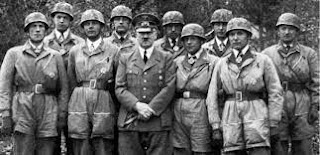Adolf Hitler left the army and joined the German Workers Party and subsequently took over the party and renamed it the Nationalsozialistische Deutsche Arbeiterpartei or Nazi for short.
The party had its own paramilitary wing which was named Storm Detachment or SA or short. It was used to defend Nazi party meetings. The SA attracted many German-trained soldiers and the SA became the largest paramilitary wing in Germany with over 3 million strong.

Hitler was a powerful speaker. His passion and his words moved
people. He promised to build a strong nation, undo the injustice of
the Versailles Treaty and restore the dignity of the German people.
He promised employment for those looking for work, and a secure
future for the youth. He promised to weed out all foreign influences
and resist all foreign ëconspiraciesí against Germany.
Hitler devised a new style of politics. He understood the significance of rituals and spectacle in mass mobilization. Nazis held massive rallies and public meetings to demonstrate their support for Hitler and instill a sense of unity among the people. The Red banners with the swastika, the Nazi salute, and the ritualized rounds of applause after the speeches were all part of this spectacle of power.
Nazi propaganda skillfully projected Hitler as a messiah, a savior, as someone who had arrived to deliver people from their distress. It is an image that captured the imagination of a people whose sense of dignity and pride had been shattered, and who were living in a time of acute economic and political crises.
On 30 January 1933, President Hindenburg offered the Chancellorship, the highest position in the cabinet of ministers, to Hitler. By now the Nazis had managed to rally the conservatives to their cause. Having acquired power, Hitler set out to dismantle the structures of democratic rule. A mysterious fire that broke out in the German Parliament building in February facilitated his move. The Fire Decree of 28 February 1933 indefinitely suspended civic rights like freedom of speech, press, and assembly that had been guaranteed by the Weimar constitution.
On 3 March 1933, the famous Enabling Act was passed. This Act established a dictatorship in Germany. It gave Hitler all powers to sideline Parliament and rule by decree. All political parties and trade unions were banned except for the Nazi Party and its affiliates.
Hitler assigned the responsibility of economic recovery to the economist Hjalmar Schacht who aimed at full production and full employment through a state-funded work-creation programme. This project produced the famous German superhighways and thepeopleís car, the Volkswagen. In foreign policy also Hitler acquired quick successes. He pulled out of the League of Nations in 1933, reoccupied the Rhineland in 1936, and integrated Austria and Germany in 1938 under the slogan. One people, One empire, and One leader
. He then went on to wrest German-speaking Sudentenland from Czechoslovakia and gobbled up the
entire country. In all of this, he had the unspoken support of England, which had considered the Versailles verdict too harsh. These quick successes at home and abroad seemed to reverse the
destiny of the country. Hitler did not stop here. Schacht had advised Hitler against investing hugely in rearmament as the state still ran on deficit financing. Cautious people, however, had no place in Nazi Germany. Schacht had to leave.
Hitler chose war as the way out of the approaching economic crisis. Resources were to be accumulated through the expansion of territory. In September 1939, Germany invaded Poland. This started a war with France and England. In September1940, a Tripartite Pact was signed between Germany, Italy, and japan, strengtheningHitlerís claim to international power. Puppet regimes, supportive of Nazi Germany, were installed in a largepart of Europe. By the end of 1940, Hitler was at the pinnacle of his power.

Hitler now moved to achieve his long-term aim of conquering eastern Europe. He wanted to ensure food supplies and living space for Germans. He attacked the Soviet Union in June 1941. In this historic blunder, Hitler exposed the German western front to British aerial bombing and the eastern front to the powerful Soviet armies. The Soviet Red Army inflicted a crushing and humiliating defeat on Germany at Stalingrad.
In May 1945, Germany surrendered to the Allies. Anticipating what was coming, Hitler, his propaganda minister Goebbels and his entire family committed suicide collectively in his Berlin bunker in April.













Comments
Post a Comment